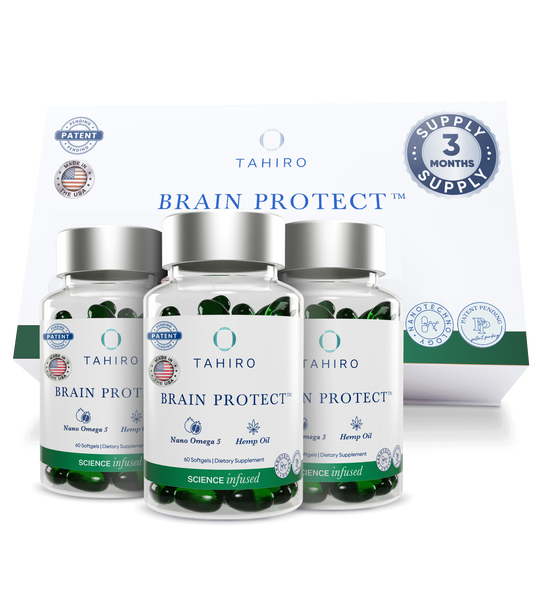For those exploring natural solutions for wellness or specific health concerns, understanding the difference between hemp oil and CBD oil is essential. Each offers unique benefits and drawbacks, and the best choice depends on your specific needs, such as relief from stress, improved brain health, or simply enhancing daily nutrition. This guide clarifies the contrasts and connections between these two oils to help you make an informed decision (1)(2).
What is Hemp Oil?
Hemp oil, also known as hemp seed oil, is extracted from the seeds of the Cannabis sativa plant. The oil does not contain CBD but is packed with essential fatty acids, vitamins, and nutrients, making it a popular choice for cooking and skin care. With little to no cannabinoid content, hemp oil provides nourishing benefits without any psychoactive effects (1)(6).
Pros
- Rich in essential fatty acids and nutrients.
- Ideal for general wellness and skin health.
- Typically more affordable than CBD oil.
- Contains anti-inflammatory properties, which may help reduce inflammation and support joint health.
Cons
- Contains little to no CBD, limiting its therapeutic uses.
What is Cannabidiol (CBD) Oil?
CBD oil, or cannabidiol oil, is derived from the flowers, leaves, and stalks of the hemp plant, where CBD content is concentrated. Known for its interaction with the body's endocannabinoid system, CBD oil is popular for managing stress, pain, and sleep issues. CBD oil typically has a higher price point than hemp oil due to the complex extraction processes required to maintain cannabinoid potency (3)(7).
Pros
- Interacts with the body’s endocannabinoid system to help manage stress, pain, and sleep issues.
- Exhibits powerful anti-inflammatory effects that may help alleviate chronic inflammation and support long-term pain management.
- Rich in antioxidants, offering potential neuroprotective benefits by shielding nerve cells from damage caused by free radicals, which may contribute to brain health and cognitive function.
Cons
- Generally higher cost compared to hemp oil, which may be a consideration for those seeking a more affordable wellness option.
- Subject to stricter regulations in certain regions, which could limit availability or add complexity for users.
- Not all CBD products are created equal—different types of CBD target specific needs, and finding the right type can be confusing.
- Many companies may not prioritize targeted formulations, which can result in products that are less effective for addressing particular health concerns, leading to potential disappointment for users seeking specific benefits.
Are Hemp Oil and CBD Oil Legal in the USA?
In the United States, the legality of hemp oil and CBD oil depends on specific federal and state regulations:
-
Hemp Oil: Derived from hemp seeds, hemp oil typically contains no THC or CBD and is legal across all 50 states. It is classified as a dietary supplement and is commonly used in foods, skincare, and wellness products without restriction (5).
-
CBD Oil: The 2018 Farm Bill federally legalized hemp-derived products containing no more than 0.3% THC. This allows the sale and use of CBD oil derived from industrial hemp under federal law, as long as it meets this THC threshold. However, state laws vary widely:
-
Legal in Most States: In most states, CBD oil with 0.3% THC or less is legal for purchase and use.
-
Restrictions in Some States: Certain states, like Idaho, Nebraska, and South Dakota, have stricter regulations or require that CBD products contain 0% THC. Only CBD isolate (containing no THC) may be permitted in these states (5)(8).
-
Medical Use Only<: In a few states, CBD is legal only for specific medical purposes with a doctor’s recommendation (9).
Important Note: Regulations are continuously evolving, so it's advisable to check your state’s current laws to ensure compliance (9).
Hemp Oil vs. CBD Oil - Similarities
While distinct in composition, hemp oil and CBD oil share some common features:
-
Natural Originn>
-
Health Benefits: Hemp oil provides essential nutrients, while CBD oil offers therapeutic effects, both contributing to overall wellness (3).
-
Legal and Safe: Both are widely available, though CBD oil may have stricter restrictions (5)(10).
Hemp Oil vs. CBD Oil - Differences
Understanding the differences can help you decide which oil suits your needs best.
-
CBD Content: Hemp oil has little to no CBD, while CBD oil is cannabidiol-rich (6).
-
Intended Use: Hemp oil is suited for nutritional needs, while CBD oil is used for it’s neuroprotection, stress relief and pain management (3)(7).
-
Price and Availability: Hemp oil is generally more affordable and widely available compared to CBD oil (4).
Tahiro’s Brain Protect™ provides an easy, nutrient-dense solution for those seeking brain health benefits without the cost of CBD oil (2).
Dosing and Safety Considerations
When using hemp oil or CBD oil, dosing can vary depending on factors like body weight, intended use, and individual tolerance. Generally:
-
Hemp Oil: It is safe to consume 1-2 tablespoons per day as a dietary supplement. For skin care, apply a small amount directly to the skin.
-
CBD Oil: Typical doses range from 5-25 mg per day, depending on the condition. Consult your healthcare provider for guidance, especially if using CBD oil for pain, anxiety, or sleep.
Who Should Avoid These Oils?
-
Pregnant or breastfeeding women should consult their doctors before using either oil.
-
People with liver conditions may need to avoid CBD oil, as it can interfere with liver enzymes.
-
Those taking medication>: CBD may interact with certain medications, so always consult a healthcare provider if you’re taking prescription drugs (10).
When Should You Use Hemp Oil?
Hemp oil is beneficial for:
-
Nutritional Supplementation: Rich in omega-3 and omega-6, ideal for daily wellness (6).
-
Skin Care: Frequently used in moisturizers due to its hydrating properties (7).
-
Overall Health Maintenance: Suitable for those seeking a natural boost without cannabinoids (6).
When Should You Use CBD Oil?
CBD oil may be ideal if you:
-
Struggle with Anxiety or Stress: Many users find CBD oil calming and balancing (3).
-
Have Pain or Inflammation: Known for its anti-inflammatory effects, CBD oil can help manage chronic discomfort (7).
-
Experience Sleep Issues: The calming effects of CBD can aid with sleep, especially for those with occasional insomnia (8).
-
Brain Health and Cognitive Function: While CBD oil provides general wellness benefits, products like Brain Protect are specifically designed to enhance memory, reduce tremors, and support overall cognitive health, offering targeted neuroprotective support.
How Do I Choose Between Hemp Oil and CBD Oil?
Select hemp oil if you're looking to improve general wellness or for a natural skincare product. CBD oil, on the other hand, is ideal for those seeking targeted support for stress, pain management, or sleep. If your focus is on brain health, cognitive support, or managing symptoms like memory decline and tremors, consider Brain Protect as a specialized option designed to promote long-term brain health and enhance cognitive function. Choose based on your specific health goals and the support you need.





